
UX Design • UX Research • Mobile
iGotch-U
Fostering connections among university graduate students through instant and personalized academic support
Client: University of Toronto’s Innovation Hub
Duration: 8 weeks
My Role: User Research, Usability Testing, Wireframing, Prototyping, Heuristic Evaluation and Presentation Design
Tools: Mural, Figma, Adobe Illustrator and Canva
Team: 3 UX Researchers & 2 UX Designers
🤔 Problem
How might we help graduate students receive academic and social support so that they feel connected and competent during their education?
Many students struggle to get academic help, balance school and social life, and feel like they don't belong to a community due to the large and dispersed student population. Orientation programs mainly focus on helping undergraduate students get involved, stay connected, and get support. However, they don't meet the unique and diverse needs of graduate students.
Context: The project was done with the University of Toronto's Innovation Hub, a student-led initiative researching strategies to improve the campus experience. We focused on "Fostering connectedness" from the Innovation Hub's 5 Domains of Innovation and used the IBM Activation Journey for the project's design thinking process.
💡 Solution
iGotch-U, a mobile application made for UofT graduate students to help them find an accountability buddy.

How would this benefit the university?
Business Value Added:
📚 Higher student retention and degree completion rates
👩🏻🎓 Stronger student connections would allow for a stronger alumni network and program growth, with other long-term benefits such as alumni donations.
🏫 Positive impact on reputation and more optimistic perception of the University of Toronto’s community.
🕵🏻♀️ User Research & Analysis
Our secondary research identified key factors affecting the graduate student experience, such as the influence of social, academic, and professional relationships, the absence of self-efficacy, the need for a work-life balance, online vs. in-person class experiences, and feelings of isolation.
We dived deeper and carried out our primary research through online surveys and semi-structured interviews to further understand the pain points and struggles faced by new graduate students.
🔍What did we discover?
Findings derived from 53 online surveys and 10 semi-structured interviews with newly enrolled Master students at the University of Toronto
😓 Student’s Pain Points:
“I don’t know where the resources are…”
“I don’t know who to reach out to for academic help…”
Our study made it clear that we needed to focus on the area of belonging and community specifically through an academic support system. We found that graduate students tend to make friendships within their program that are more academic-oriented, compared to undergraduate connections, which are more social-focused.
“I want to get involved but I’m not sure how to…”
Recurring Themes from Primary Research:
Summary of our findings from affinity mapping
Click to enlarge Affinity Map
Gina’s current scenario….
We explored Gina’s daily journey and visualized her pain points through her first semester.
It was clear that starting coursework, and seeking help for assignments were areas where she struggled the most.
Gina needs:
• a way to overcome her lack of confidence, so that she can easily reach out to others for support
• a way to maintain a work-life balance, so that she can excel academically while socializing
• a way to make peer connections, so that she feels supported by her program’s community
🙋🏻♀️ Meet Gina
Through our findings, we got to step into the shoes of our users and define our persona.
Meet Gina the graduate student. She’s a first-year master’s student transitioning into graduate school after working for a few years and is living in Toronto alone for the first time.
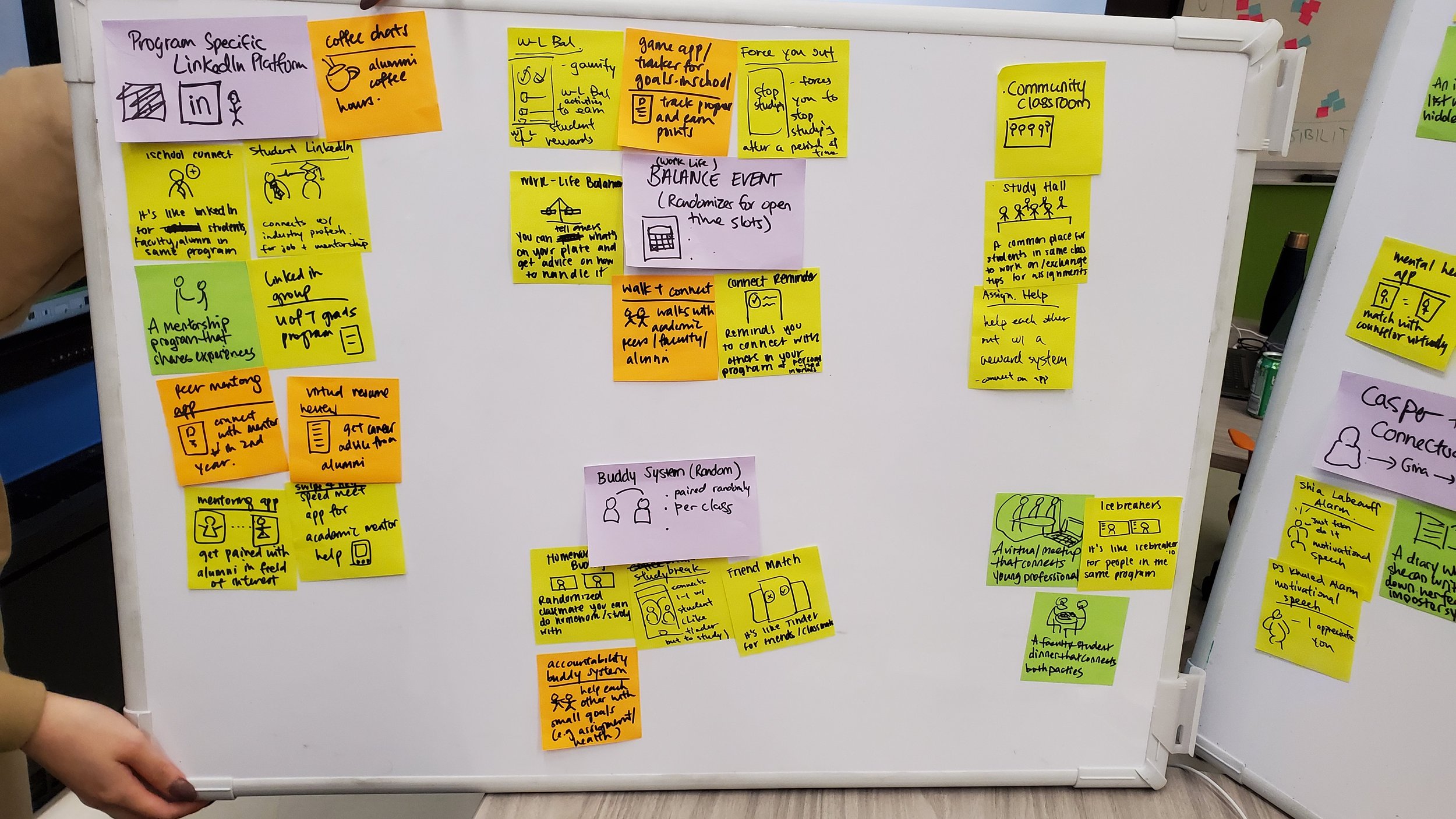
“How might we help Gina gain academic and social support so that she can adjust to grad life smoothly and easily?”
📝 Ideation
With Gina’s obstacles and desires in mind, we continued onto the brainstorming stages of our process and came up with ideas that would cater to her need statements.
No ideas were left behind, apart from the realistic ones, we came up with some absurd ideas such as a motivational pep talk given by a celebrity of your choice.
We voted on our top picks and prioritized them as quick wins (high feasibility & low impact) and big bets (low feasibility & high impact).
We chose our home run idea ⚾️ with high feasibility with high impact - an accountability buddy system that combines social connection with academic adjustment.
Gina’s new journey
With a new system at play, we re-envisioned Gina’s trajectory in her first semester of graduate school with the implementation of the accountability buddy system.
📱 Design
iGotch-U
A mobile app made for UofT graduate students to help them find an accountability buddy
Now with an ideal solution in mind along with Gina’s needs, we crafted design goals that would act as key performance indicators to help Gina hit it out of the park 🏏
Gina can find peers with shared academic goals, in her first week of graduate school
She can get instant, personalized academic support before she starts losing motivation
Gina can stay on track with her goals while having time to grow her social circle
With these, we curated 3 specific task flows as the most viable product for the application.
Prototypes & Testing
After multiple iterations and collaborative inputs, we narrowed in on a basic flow of a low-fi prototype to conduct our initial round of usability testing.
Usability Testing
We conducted low-fidelity usability testing with 5 tech-savvy 1st-year professional master’s students, where we asked them to think aloud while completing 3 tasks related to the 3 specified task flows.
Theme 1: Ease of Use “Don’t Make Me Think!”
• Users suggested integration with existing platforms, skipping certain steps & clearer wording
Theme 2: Legitimacy “I This Like…Legit?”
• Users felt secure knowing the application was affiliated with the university and wanted to ensure it was safeguarded and had reporting mechanisms in the event of plagiarism and academic integrity.
Theme 3: “What If I Don’t Want To…”
• Users felt like some parts should be optional with more flexibility, certain fields were made mandatory in order to proceed in the setup stages.
Design Decisions based on User Testing
Before starting our mid-fidelity prototype, we derived some design changes that would be applied in the next steps
-
1. Simplified Sign-up
Before: Create an account, then verify UTORid & student number
After: Sign in with UTORid credentials - more legitimacy, familiarity and security
-
2. More Confirmation
Before: Very little confirmation throughout the extended setup
After: More validation and micro-interactions to the user - delivering confidence and mitigating doubt for the next action
-
3. Improved Matching
Before: Randomizer option
After: Top matches highlighted - clearer distinction from dating app features, making the process intentional and selective
-
4. More Task Updates
Before: Sole options of “complete” and “incomplete”
After: More progress options and variety of status tags - signals the idea of progress over completion to further encourage the user
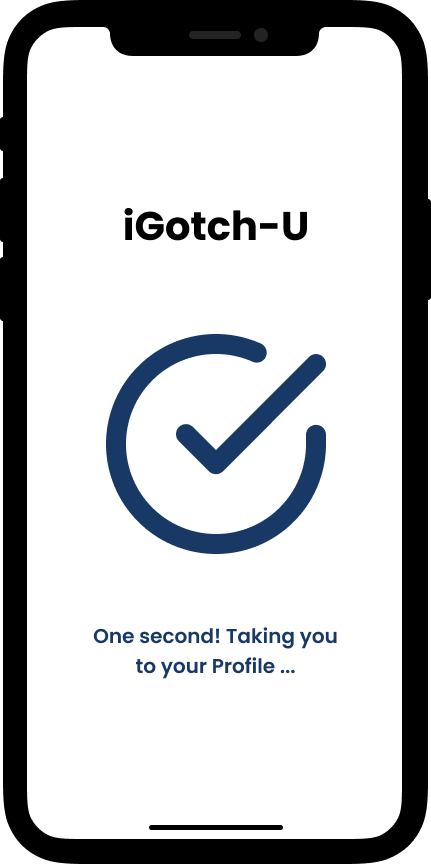
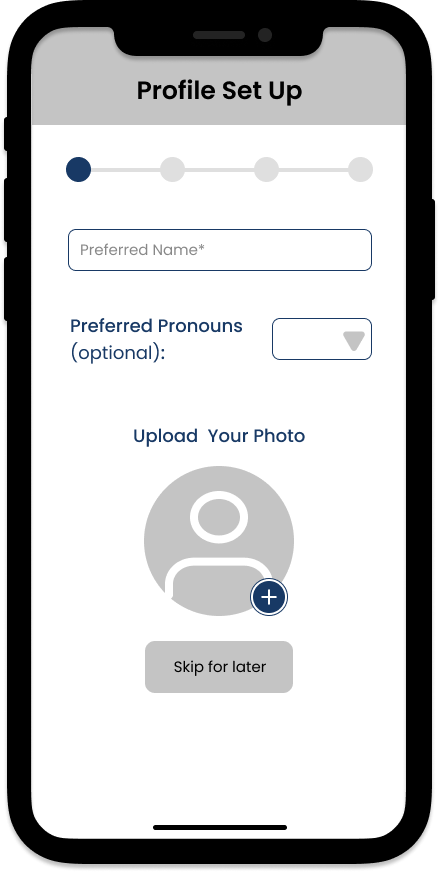
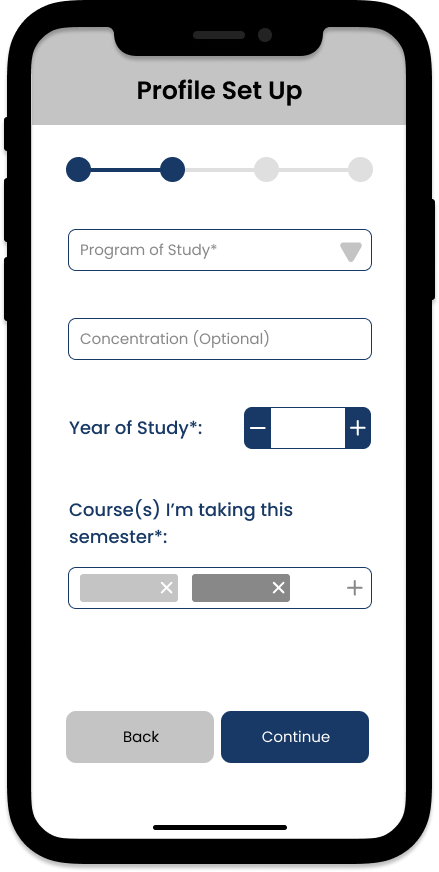
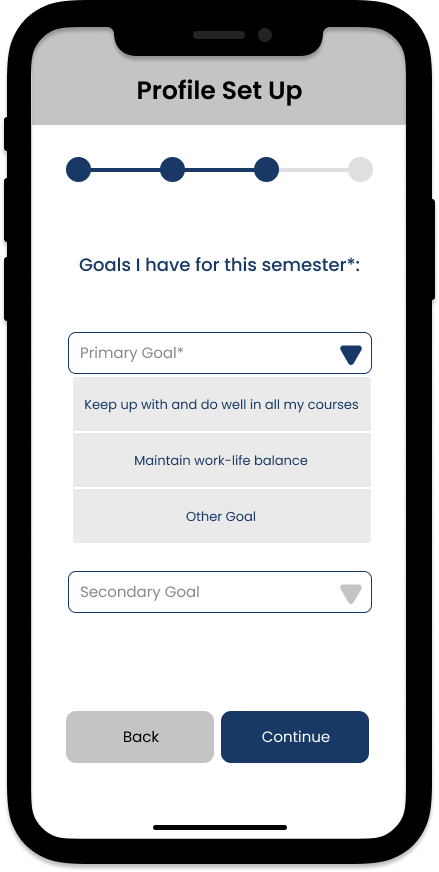
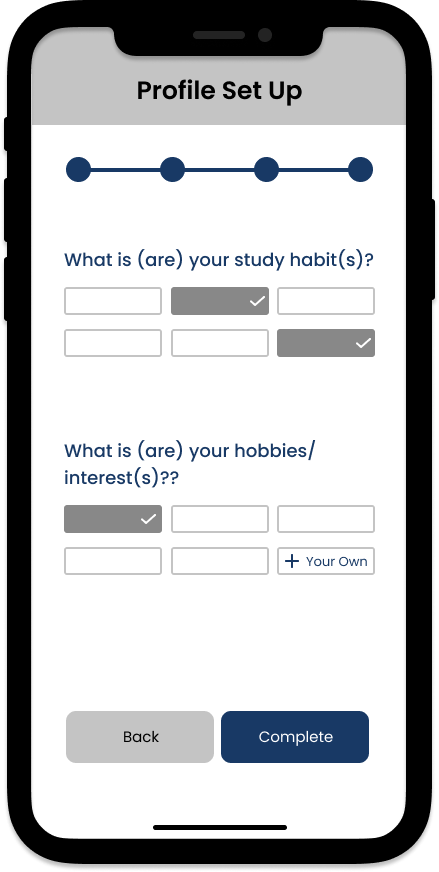
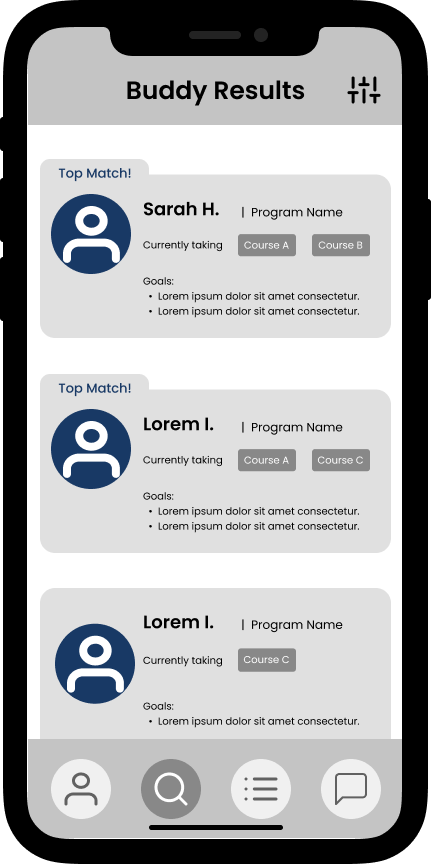
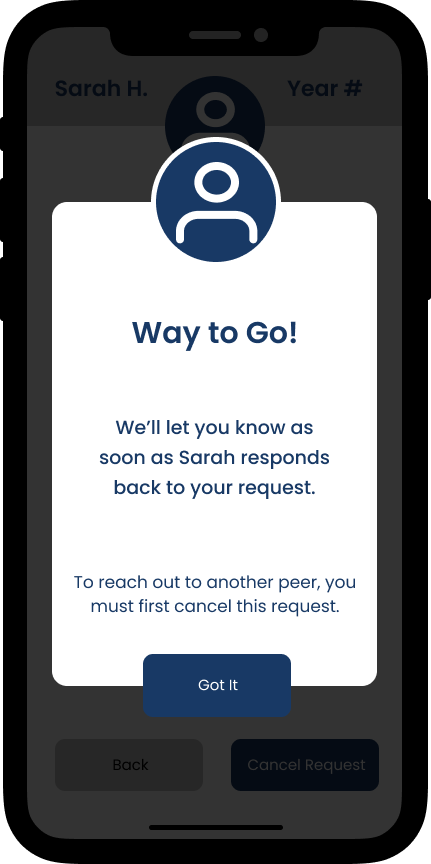
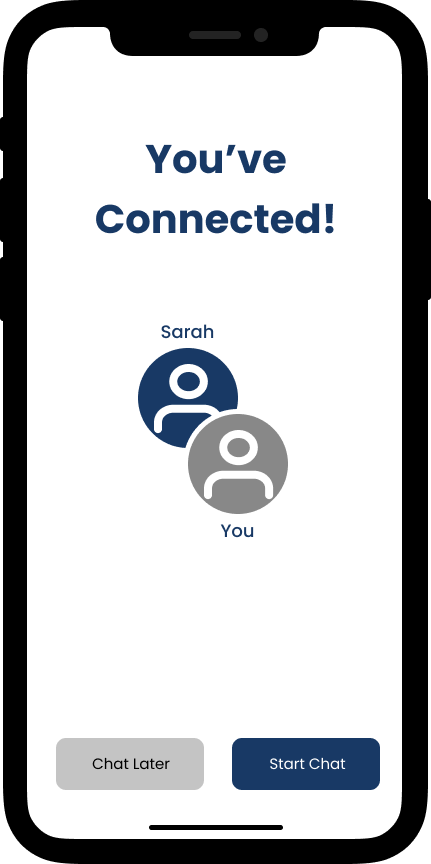
Evaluation
To test the decisions carried out into the mid-fi prototype, we focused on two evaluation goals for our final round of testing:
• How do user expectations on peer connection and alignment with our features?
• How do people experience the user flow experience?
We conducted usability testing and a semi-structured interview with 3 tasks with scenarios under observation with 3 master’s students remotely.
Why? We wanted to observe user reactions and behaviour in naturalized environments, examine attitudes, and discover barriers in the user flow to iterate on.
Next Steps
iGotch-U is a work in progress, here are some potential next steps to iterate the design on:
Lessons Learned
Don’t get too attached to the finer details - design is an iterative process with things constantly evolving and changing.
Group Communication - an integral part of any design collaboration is to constantly be in the loop with one another, to avoid doubling up or missing any steps and increase overall efficacy.
Storytelling & Perspective-taking are critical components to any user experience study, in order to build empathy with the user, and understand their needs and pain points.
Today is a prototype, tomorrow is another one - with the iterative nature of this activation journey, staying in the problem space until ideas are concrete is what would lead to successful design.














